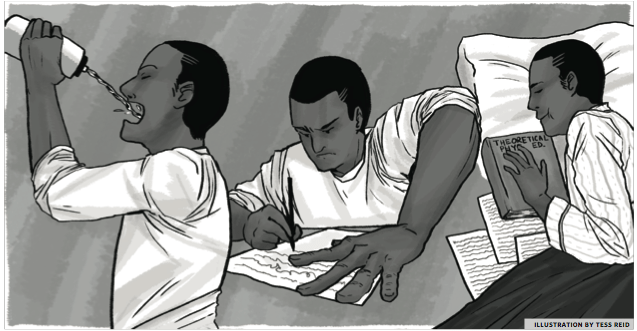Look almost anywhere, and you’ll find vague strategies on how to prepare for a test. Usually these involve re-organizing the way you live your life, and often, they simply don’t help that much. This list comes from a skilled test-taker, and these tips are very straightforward: any one of them will help you in your studies, but combine all 10, and you’ll be acing those Gen Eds you never even at- tended.
10. Drink water.
Elsewhere, you’ll read that hydration helps with enzymes in the lower lobe of the frontal, etc. Listen, hydration helps you stay awake so you won’t get that tired feeling in your eyes on page six of your textbook. That’s why you should drink water.
9. Don’t drink other stuff.
It’s tempting to go out and have fun, but wait until your midterms are done to celebrate.
Drinking alcohol temporarily clouds your brain. It can make you forget material you’ve already studied and may make it more dif- ficult to retain new information.
8. Create a study schedule.
It takes about four minutes to thoroughly read one page in those giant textbooks. During midterms, you’re usually tested on about two chapters – maybe up to 40 pages each. It’ll take about 320 minutes to read all of that. If you add in the time it takes to write down your own notes, that number goes up to around 600.
Seems like a lot, but 600 minutes broken into just four days is 150 minutes a day — a little over two hours. Cut that time into three chunks per day, and you have 50 minutes in the morning, 50 in the afternoon, and 50 in the evening. Yet I guarantee 90 per cent of students will think 80 pages of material is totally not doable.
7. Study the morning of the exam.
Plan for lots of sleep the night before the exam. Seven to nine hours seems to be the perfect amount for many people, so if your exam is at 11 a.m., try to get to bed by 1 a.m. the night before, especially if you live off-campus. Give yourself a bit of time to skim through important notes again in the morning — this can be a game-changer during the test.
6. Use Google!
Sometimes you don’t under- stand something you read in your textbook due to its ridiculous assumption that you attended class. Yes, the legitimate piece of advice here would be to go to your lectures, but if you haven’t at this point, then this is the best you can do. It’s also quicker than asking your teacher through email.
Whenever a concept doesn’t quite make sense, just type it into Google. You’ll likely get a visual ex- planation or a more simply worded definition.
A common problem test-takers face is seeing the information they studied presented in a different order, or a formula they nailed to perfection placed within a problem they never considered. Test yourself on concepts by taking them beyond how they’re given to you in your textbook.
Furthermore, mix up the order. Write down your own test ques- tions and then look at them a couple days later, when you’ve moved on to other chapters lessons.
4. Break studying into chunks.
You’ll store information better when you’re learning it piece by piece. It’s also a more encouraging way to study, as there will always be an end in sight. You can implement the reward system into this tip: every time you feel like you’ve fully memorized a chunk of information, you can do something else that you want to do for a few hours (breaks are highly recommended, since the brain processes material during its downtime).
3. Find the material interesting.
There are actually methods to enjoy classes more. If you like learning something, it will feel more like common knowledge than facts and figures, in which case taking a test will be like arguing about your passion. This works for both essay-based exams and multiple choice ones – you simply remember things you like.
If it’s a history class, try look- ing at the information as a story. Imagine writing a book or movie about the events, with the historical figures as the lead characters. If it’s a science class, think about the information as “Did you know?” facts.
A lot of people type their notes. They end up looking super-organized, and they’re even easier to search through with the old Ctrl-F. But guess what? You’re way more likely to remember words you wrote out in pen or pencil. If you’ve been taking notes on your laptop during lectures, try re-writing some of them on paper during crunch time. Then, re-read what you wrote in pen — it will be a condensed version of what you need to know, aka study notes!
This truly is the #1, top-secret, foolproof study tip. Your brain processes information most during sleep. So if you take naps after a study chunk, or do your studying at night, a few minutes before you go to bed, you’ll wake up knowing what you studied better than you did when you went to sleep.
This tip is so effective, it feels like a video game cheat in real life. This is why it’s a good idea to
start studying several days before a test – an hour or two before bed for four days will invariably pro- duce better results than studying for twice that long the day before the test.
So, with these tips in tow, get back to your readings, and get ready to conquer your midterms.
Dustin Dyer
Features Editor



